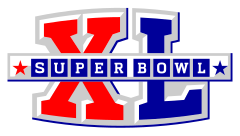
Back Super Bowl XL AST Super Bowl XL Danish Super Bowl XL German Super Bowl XL Spanish Super Bowl XL Finnish Super Bowl XL French Super Bowl XL Croatian Super Bowl XL Hungarian Super Bowl XL Icelandic Super Bowl XL Italian
 | |||||||||||||||||||
| |||||||||||||||||||
| |||||||||||||||||||
| Date | February 5, 2006 | ||||||||||||||||||
|---|---|---|---|---|---|---|---|---|---|---|---|---|---|---|---|---|---|---|---|
| Stadium | Ford Field, Detroit, Michigan | ||||||||||||||||||
| MVP | Hines Ward, wide receiver | ||||||||||||||||||
| Favorite | Steelers by 4[1][2] | ||||||||||||||||||
| Referee | Bill Leavy | ||||||||||||||||||
| Attendance | 68,206[3] | ||||||||||||||||||
| Hall of Famers | |||||||||||||||||||
| Seahawks: Steve Hutchinson, Walter Jones Steelers: Dan Rooney (owner/administrator), Bill Cowher (head coach), Bill Nunn (scout), Jerome Bettis, Alan Faneca, Troy Polamalu | |||||||||||||||||||
| Ceremonies | |||||||||||||||||||
| National anthem | Aaron Neville, Aretha Franklin and Dr. John, ASL performed by Angela LaGuardia | ||||||||||||||||||
| Coin toss | Tom Brady, representing previous Super Bowl MVPs | ||||||||||||||||||
| Halftime show | The Rolling Stones | ||||||||||||||||||
| TV in the United States | |||||||||||||||||||
| Network | ABC | ||||||||||||||||||
| Announcers | Al Michaels, John Madden, Michele Tafoya and Suzy Kolber | ||||||||||||||||||
| Nielsen ratings | 41.6 (national) 55 (Seattle) 57.1 (Pittsburgh) U.S. viewership: 90.7 million est. avg., 141.4 million est. total[4] | ||||||||||||||||||
| Market share | 62 (national) | ||||||||||||||||||
| Cost of 30-second commercial | $2.5 million | ||||||||||||||||||
| Radio in the United States | |||||||||||||||||||
| Network | Westwood One | ||||||||||||||||||
| Announcers | Marv Albert, Boomer Esiason, John Dockery and Bonnie Bernstein | ||||||||||||||||||
Super Bowl XL was an American football game between the National Football Conference (NFC) champion Seattle Seahawks and the American Football Conference (AFC) champion Pittsburgh Steelers to decide the National Football League (NFL) champion for the 2005 season. The Steelers defeated the Seahawks by the score of 21–10. The game was played on February 5, 2006, at Ford Field in Detroit, Michigan. It is the most recent Super Bowl broadcast on ABC who lost the rights to broadcast Super Bowl games in the next NFL TV contract (though under a new contract the network is scheduled to broadcast Super Bowl LXI) and the first where all aspects of the game itself were aired in HD.[5] This was the last of 10 straight Super Bowls to feature a team seeking its first win.
With the win, the Steelers tied the San Francisco 49ers and the Dallas Cowboys with the then-record five Super Bowl victories (a record the Steelers themselves would break three years later). The Steelers' victory was their first Super Bowl victory since Super Bowl XIV. Pittsburgh, who finished the regular season with an 11–5 record, also became the fourth wild card team, the third in nine years, and the first ever number 6 seed in the NFL playoffs, to win a Super Bowl. The Seahawks, on the other hand, in their 30th season, were making their first ever Super Bowl appearance after posting an NFC-best 13–3 regular season record.
Pittsburgh capitalized on two big plays that were converted into touchdowns. The Steelers jumped to a 14–3 lead early in the third quarter with running back Willie Parker's Super Bowl record 75-yard touchdown run. Seahawks defensive back Kelly Herndon's then-Super Bowl record 76-yard interception return set up a Seattle touchdown to cut the lead 14–10. But Pittsburgh responded with Antwaan Randle El's 43-yard touchdown pass to Hines Ward, the first time a wide receiver threw a touchdown pass in a Super Bowl, to clinch the game in the fourth quarter. Ward, who caught 5 passes for 123 yards and a touchdown, while also rushing for 18 yards, was named Super Bowl MVP.
The officiating in Super Bowl XL was met with criticism from members of the media soon after the game, leading NFL Films to rank it as one of the top ten controversial calls of all time.[6]
- ^ DiNitto, Marcus (January 25, 2015). "Super Bowl Betting History – Underdogs on Recent Roll". Sporting News. Archived from the original on February 4, 2015. Retrieved February 4, 2015.
- ^ "Super Bowl History". Vegas Insider. Retrieved February 4, 2015.
- ^ "Super Bowl XL Box Score: Pittsburgh 21, Seattle 10". NFL.com. National Football League. February 6, 2006. Retrieved March 10, 2018.
- ^ Cosgrove-Mather, Bootie (February 6, 2006). "Super Bowl Earns Super Ratings". CBS News. Retrieved February 4, 2018.
- ^ Cite error: The named reference
broadcastingcablewas invoked but never defined (see the help page). - ^ NFL Top 10 – Controversial Calls. NFL Films.
© MMXXIII Rich X Search. We shall prevail. All rights reserved. Rich X Search